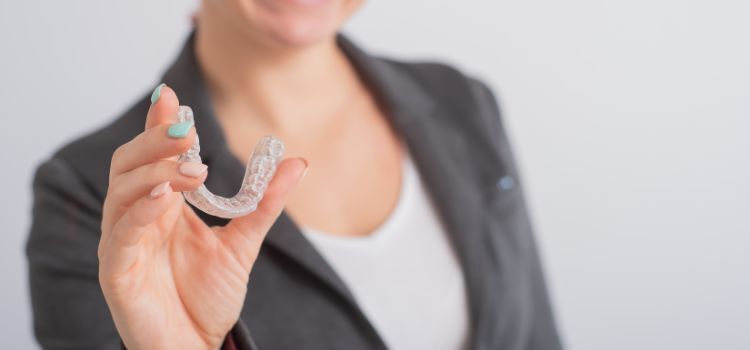Can Menopause Cause Teeth Clenching
30th May 2025

Menopause can bring a lot of changes, and along with hot flashes and mood swings, many women experience teeth clenching or grinding. If you're dealing with this, you're not alone. It’s a common issue during menopause, and while it might seem small, it can cause discomfort and damage to your teeth.
In this article, we'll explain why teeth clenching happens during menopause and offer simple tips to help manage it and keep your smile healthy.
Does Menopause Lead to Teeth Clenching?

Menopause may lead to teeth clenching, a condition known as bruxism. This phenomenon is primarily influenced by hormonal changes, stress, and sleep disturbances associated with menopause.
Hormonal Changes
Estrogen fluctuations during menopause can impact pain modulation in the temporomandibular joint (TMJ) and the orofacial region. Some studies suggest that higher estrogen levels may reduce TMJ pain, while lower levels could have the opposite effect. However, findings are mixed, and more research is needed to fully understand this relationship.
Stress and Anxiety
The menopausal transition often brings increased stress and anxiety, which are known risk factors for bruxism. Emotional stress can lead to heightened muscle activity, including jaw clenching. A systematic review highlighted that stress is among the most commonly accepted factors contributing to bruxism.
Sleep Disturbances
Many women experience sleep problems during menopause, such as insomnia and frequent awakenings. These disturbances can exacerbate bruxism, as disrupted sleep patterns may lead to increased jaw muscle activity. Research indicates that sleep bruxism is more prevalent among women with obstructive sleep apnea, a condition that can become more common during menopause.
Note: In summary, the interplay of hormonal changes, stress, and sleep disturbances during menopause can contribute to teeth clenching. If you're experiencing symptoms like jaw pain, tooth sensitivity, or disrupted sleep, it's advisable to consult with a healthcare professional for personalized advice and management strategies.
Related Articles:
- The Relationship Between Bruxism and Stress
- Scientifically Proven Ways Sleep Affects Your Health
- PTSD And Bruxism

- Most Popular
- Hard Outside, Soft Inside
- 2MM Thick
- Moderate / Heavy

- Most Durable
- Hard Materials
- 1.5MM Thick
- Heavy / Severe

- For Day Time Use
- Thin, Barely Visible
- 1MM Thick
- Light / Moderate

- For Clenching
- Flexible & Soft
- 1.5MM Thick
- Light / Moderate
How to Identify Teeth Clenching Symptoms
Teeth clenching, often linked to menopause, can be hard to spot at first, especially since it may happen while you're asleep. However, there are a few common symptoms to watch out for:
Jaw Pain or Discomfort:
If you wake up with soreness in your jaw, face, or neck, it could be a sign that you're clenching your teeth at night. Some people also feel tightness in the jaw muscles.
Tooth Sensitivity
Teeth that are more sensitive to hot, cold, or pressure may be a sign of teeth grinding or clenching. Over time, clenching can wear down the enamel and cause this sensitivity.
Headaches or Migraines
Tension headaches, often around the temples, are a common result of clenching your teeth. These headaches are typically caused by the strain on your jaw muscles.
Worn-Down Teeth
If you notice that your teeth are looking flat or chipped, it could be due to the pressure from constant clenching. Bruxism can lead to significant wear on the teeth over time.
Ringing in the Ears (Tinnitus)
Some people experience a ringing sound in the ears, often associated with jaw tension or clenching. This may be a less common but still notable symptom.
Note: If you’re experiencing any of these signs, it’s a good idea to see a dentist. They can help confirm if your symptoms are related to teeth clenching and recommend the best course of action to protect your dental health.
How to Manage and Prevent Teeth Clenching During Menopause

If you’re dealing with teeth clenching during menopause, there are several strategies you can try to manage and prevent the issue. Taking action now can help protect your dental health and reduce discomfort. Here are some practical tips:
Try a Night Guard
A custom night guard is a simple and effective way to protect your teeth from the damage caused by clenching. This soft, removable appliance fits over your teeth and prevents them from grinding against each other while you sleep. It can reduce discomfort in the jaw and teeth and help prevent long-term damage.
Manage Stress and Anxiety
Menopause can bring about emotional challenges, and stress can contribute to teeth clenching. Finding ways to relax and manage stress is key. Practices like yoga, meditation, and deep breathing exercises can help calm your mind and reduce tension in your jaw. Regular physical activity, such as walking or swimming, can also lower stress levels and improve overall well-being.
Consult with Your Dentist
If you’re experiencing persistent teeth clenching, it’s a good idea to visit your dentist. They can assess the severity of the issue and recommend treatment options, including a custom night guard. In some cases, your dentist might suggest other interventions, such as physical therapy or medications to relax the jaw muscles.
Improve Sleep Quality
Sleep disturbances are common during menopause and can worsen teeth clenching. Creating a calming bedtime routine, such as avoiding caffeine or electronic screens before bed, can help improve the quality of your sleep. If sleep apnea or other issues are contributing to your teeth clenching, a healthcare professional can help guide you toward the right solution.
Stay Hydrated and Maintain a Healthy Diet
Dehydration and poor nutrition can exacerbate stress and muscle tension. Drinking plenty of water and eating a balanced diet rich in vitamins and minerals can help keep your muscles and jaw healthy. Magnesium-rich foods, such as leafy greens and nuts, may also help with muscle relaxation.
Note: By taking proactive steps to manage stress, protect your teeth, and improve sleep quality, you can reduce the impact of teeth clenching during menopause. If you’re uncertain about the best approach for you, don't hesitate to seek guidance from a dentist or healthcare provider.
Conclusion
Teeth clenching during menopause is a common issue that many women face, but it’s one that can be managed effectively. The hormonal changes, stress, and sleep disturbances that come with menopause can lead to jaw tension and discomfort, but with the right strategies, you can protect your teeth and improve your overall well-being.
By managing stress, using a night guard, and consulting with a dentist, you can prevent damage to your teeth and relieve the discomfort associated with teeth clenching. Remember, you’re not alone—many women experience this during menopause, and there are solutions available to help.
At Pro Teeth Guard, we specialize in providing high-quality, custom-fit night guards designed to protect your teeth from damage caused by clenching and grinding. Visit our website today to learn more about how our night guards can help you maintain a healthy, pain-free smile during menopause.
References
- Heilman, J. M., & West, A. G. (2020). Wikipedia and medicine: Quantifying readership, editors, and the significance of natural language. Journal of Medical Internet Research, 22(3), e62. https://doi.org/10.2196/jmir.4069
- Alam, M. K., Ibrahim, M. A., Almaslamani, M. J., Saeed, M. H., Siurkel, Y., Ronsivalle, V., Cicciù, M., & Minervini, G. (2024). Correlating estrogen replacement therapy and temporomandibular disorders: A comprehensive review following PRISMA principles and Cochrane handbook for systematic reviews of interventions. BMC Oral Health, 24, 93. https://doi.org/10.1186/s12903-023-03697-2
- Pavlou, I. A., Spandidos, D. A., Zoumpourlis, V., & Adamaki, M. (2023). Nutrient insufficiencies and deficiencies involved in the pathogenesis of bruxism (Review). Experimental and Therapeutic Medicine, 26, 563. https://doi.org/10.3892/etm.2023.12262
- Emodi-Perlman, A., Soliman, J., Frideman-Rubin, P., & Eli, I. (2022). Symptoms of nocturnal masticatory muscle activity among women of different age groups and their association to obstructive sleep apnea—A cross-sectional study. Journal of Clinical Medicine, 11(5), 1199. https://doi.org/10.3390/jcm11051199
- Emodi-Perlman, A., Soliman, J., Friedman-Rubin, P., & Eli, I. (2022). Symptoms of nocturnal masticatory muscle activity among women of different age groups and their association to obstructive sleep apnea—A cross-sectional study. Journal of Clinical Medicine, 11(5), 1199. https://doi.org/10.3390/jcm11051199

- Most Popular
- Hard Outside, Soft Inside
- 2MM Thick
- Moderate / Heavy

- Most Durable
- Hard Materials
- 1.5MM Thick
- Heavy / Severe

- For Day Time Use
- Thin, Barely Visible
- 1MM Thick
- Light / Moderate

- For Clenching
- Flexible & Soft
- 1.5MM Thick
- Light / Moderate
